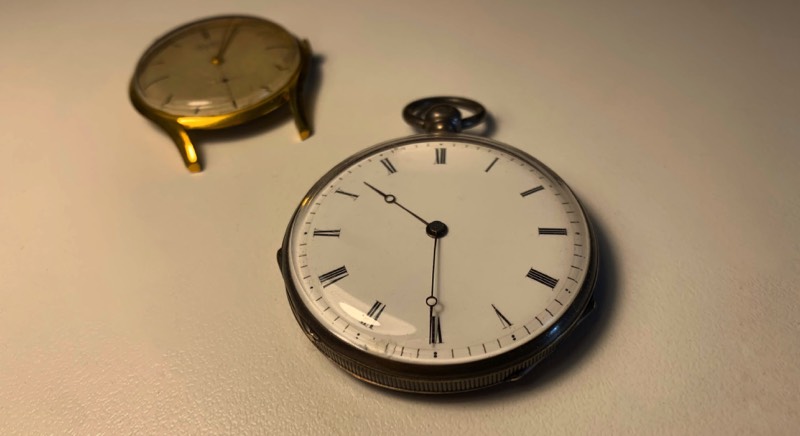Stop Messing With the Clocks
Opinion, 6 April 2024
by L.A. Davenport
Last week, I completely forgot about something horrible, terrible, a crime against humanity no less, that happens once a year, and in doing so rips us from our comfortable, cosy winter days and thrusts us blinking into the harsh light of summer.
I mean of course the putting forward of the clocks by one hour, which happens every year and switches us from Greenwich mean time to British Summer Time; or Daylight Saving Time (DST), if you prefer.
The UK Government website states simply that this means “there’s more daylight in the evenings and less in the mornings,” which hardly suffices as an explanation for the low and dirty trick that is played on us every springtime to steal an hour from us while we sleep.
Thankfully that ever-reliable organ DevonLive offers a little more insight, noting that “the change was initially introduced to make better use of the early morning sunshine as the summer months draw in,” adding: “The original campaign argued that, by changing the clocks during the summer, people in the northern hemisphere can enjoy more sunshine."
That effort was spearheaded by builder William Willett, apparently the great-great-grandfather of Coldplay singer Chris Martin.
In 1907 he published a pamphlet titled The Waste of Daylight, which recommended changing the clocks forward in spring, then back again in the autumn, albeit by advancing the clocks by 80 minutes in four separate moves of 20 minutes each.
Willett died in 1915, but one year later Parliament passed the Summer Time Act, thus establishing the practice of putting the clocks an hour forward during at the start of summer.
I mean of course the putting forward of the clocks by one hour, which happens every year and switches us from Greenwich mean time to British Summer Time; or Daylight Saving Time (DST), if you prefer.
The UK Government website states simply that this means “there’s more daylight in the evenings and less in the mornings,” which hardly suffices as an explanation for the low and dirty trick that is played on us every springtime to steal an hour from us while we sleep.
Thankfully that ever-reliable organ DevonLive offers a little more insight, noting that “the change was initially introduced to make better use of the early morning sunshine as the summer months draw in,” adding: “The original campaign argued that, by changing the clocks during the summer, people in the northern hemisphere can enjoy more sunshine."
That effort was spearheaded by builder William Willett, apparently the great-great-grandfather of Coldplay singer Chris Martin.
In 1907 he published a pamphlet titled The Waste of Daylight, which recommended changing the clocks forward in spring, then back again in the autumn, albeit by advancing the clocks by 80 minutes in four separate moves of 20 minutes each.
Willett died in 1915, but one year later Parliament passed the Summer Time Act, thus establishing the practice of putting the clocks an hour forward during at the start of summer.
All seemingly innocent enough, but it turns out that I am not alone in believing this act of thievery is an affront to all that is good in the world, and it has even been shown that the switch to British Summer Time is detrimental to our health.
In 2020, the American Academy of Sleep Medicine (AASM) published a position statement stating that the switch to DST is associated, in the short term, with an increased risk of heart attack, stroke and hospital admissions due to acute atrial fibrillation. There is also an increase in visits to accident and emergency just after the alteration of the clocks, as well as more missed medical appointments and return visits to the hospital.
The statement adds that, while the one-hour time shift in the spring results in less exposure to early morning light, our social and occupational demands carry on as normal, and so we experience sleep loss and, consequently, sleep debt, in addition to what they term “misalignment” of our circadian rhythm.
All of this has a wide-ranging impact on cellular function and gene expression, as well as the increased production of markers of inflammation, and raised heart rate and blood pressure, alongside the sleep loss.
And there’s more.
The AASM says there is even “evidence that the body clock does not adjust to DST, even after several months,” and the “chronic misalignment between the timing of demands of work, school, or other obligations” imposed by the change in hour and our innate circadian rhythm, which is unaffected by moving the clocks forward, results in “social jet lag.”
“Studies show that social jet lag is associated with an increased risk of obesity, metabolic syndrome, cardiovascular disease, and depression."
Ouch.
In 2020, the American Academy of Sleep Medicine (AASM) published a position statement stating that the switch to DST is associated, in the short term, with an increased risk of heart attack, stroke and hospital admissions due to acute atrial fibrillation. There is also an increase in visits to accident and emergency just after the alteration of the clocks, as well as more missed medical appointments and return visits to the hospital.
The statement adds that, while the one-hour time shift in the spring results in less exposure to early morning light, our social and occupational demands carry on as normal, and so we experience sleep loss and, consequently, sleep debt, in addition to what they term “misalignment” of our circadian rhythm.
All of this has a wide-ranging impact on cellular function and gene expression, as well as the increased production of markers of inflammation, and raised heart rate and blood pressure, alongside the sleep loss.
And there’s more.
The AASM says there is even “evidence that the body clock does not adjust to DST, even after several months,” and the “chronic misalignment between the timing of demands of work, school, or other obligations” imposed by the change in hour and our innate circadian rhythm, which is unaffected by moving the clocks forward, results in “social jet lag.”
“Studies show that social jet lag is associated with an increased risk of obesity, metabolic syndrome, cardiovascular disease, and depression."
Ouch.
It doesn’t stop there. The AASM notes that numerous studies have shown that the switch to DST, or British Summer Time, is associated with an increase in the number of car crashes.
This has prompted the The Royal Society for the Prevention of Accidents put out statements on a regular basis calling for the end of British Summer Time in a bid to improve road safety.
There was even a Campaign for Real Time to abolish the “out-dated patronizing lie” of DST, and “replace it with something better,” although their last post appears to have been in 2014.
There have also been motions tabled in Parliament to end the practice, although Britain's longitudinal length means there has been debate over the applicability of BST nationwide.
In 2004, English MP Nigel Beard proposed that England and Wales be able to determine their own time, independently of Scotland and Northern Ireland, while Lord Tanlaw introduced the Lighter Evenings (Experiment) Bill into the House of Lords in 2005, which would have advanced winter and summer time by one hour for a three-year trial period, with Scotland and Northern Ireland given the ability to opt out. The Bill never made it into law.
This has prompted the The Royal Society for the Prevention of Accidents put out statements on a regular basis calling for the end of British Summer Time in a bid to improve road safety.
There was even a Campaign for Real Time to abolish the “out-dated patronizing lie” of DST, and “replace it with something better,” although their last post appears to have been in 2014.
There have also been motions tabled in Parliament to end the practice, although Britain's longitudinal length means there has been debate over the applicability of BST nationwide.
In 2004, English MP Nigel Beard proposed that England and Wales be able to determine their own time, independently of Scotland and Northern Ireland, while Lord Tanlaw introduced the Lighter Evenings (Experiment) Bill into the House of Lords in 2005, which would have advanced winter and summer time by one hour for a three-year trial period, with Scotland and Northern Ireland given the ability to opt out. The Bill never made it into law.
Leaving aside whether the European Union ever implements its own plans to abolish DST, I am delighted to announce that the debate over British Summer Time ends here.
For those who seek to rid us of the daylight robbery of putting the clocks forward every year need look no further, as I have the perfect solution.
My proposal is that, while we should indeed dispense with British Summer Time, we should, indeed must, still profit from the warming delight of putting the clocks back at the end of summer, with the unbridled pleasure that it brings of that extra hour in bed, and without the awfulness of knowing it will be taken away from us in a few short months.
I admit that this will mean that, without the correction of putting the clocks forward in spring, we will slide further and further back in time at the start of each autumn. We will consequently be increasingly out of sync with daylight ours, and in a few years will have to get up in the middle of the night.
But have no fear. Every 24 years the process will correct itself and we will be once again, briefly, on the right time, happily enjoying those lovey summer days, while looking forward to that delicious hour given to us at the start of autumn.
Personally, I think it’s a price worth paying.
For those who seek to rid us of the daylight robbery of putting the clocks forward every year need look no further, as I have the perfect solution.
My proposal is that, while we should indeed dispense with British Summer Time, we should, indeed must, still profit from the warming delight of putting the clocks back at the end of summer, with the unbridled pleasure that it brings of that extra hour in bed, and without the awfulness of knowing it will be taken away from us in a few short months.
I admit that this will mean that, without the correction of putting the clocks forward in spring, we will slide further and further back in time at the start of each autumn. We will consequently be increasingly out of sync with daylight ours, and in a few years will have to get up in the middle of the night.
But have no fear. Every 24 years the process will correct itself and we will be once again, briefly, on the right time, happily enjoying those lovey summer days, while looking forward to that delicious hour given to us at the start of autumn.
Personally, I think it’s a price worth paying.
© L.A. Davenport 2017-2024.
0 ratings
Cookies are used to improve your experience on this site and to better understand the audience. Find out more here.
Stop Messing With the Clocks | Pushing the Wave

